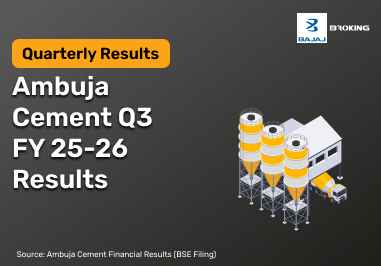Now, before you decide the kind of investment option that’s right for you, it is crucial to ensure that you’re aware of the difference between shares and mutual funds. Analysing the dissimilarities between the two options can help you make a more well-informed investment decision.
Also Read: What is Pure Play?
What are Shares?
Shares, also known as stocks or equities, represent ownership in a company. When an individual purchases shares, they acquire a portion of that company's assets and earnings. Shareholders may receive dividends, which are distributions of a company’s profits, and have the potential for capital appreciation if the company’s stock price increases. However, investing in shares requires a thorough understanding of the market and the specific companies in which one invests, as individual stock performance can be volatile and is influenced by various factors, including company performance and broader economic conditions.
Shares entitle investors to a proportional share in a company’s profits or losses and are typically issued to raise capital and boost the company’s market presence. When a company reports strong financial performance, its share prices usually trend upwards. Investors must buy shares through a Demat account, which allows them to manage their holdings independently.
Understanding the difference between shares and mutual funds is vital for any investor. While shares offer direct ownership and control, mutual funds pool money from various investors to invest in a diversified portfolio, managed by professionals. This distinction highlights the mutual funds and equity difference, especially in terms of risk, management, and diversification. Familiarity with both instruments helps investors make well-informed decisions based on their financial goals and risk appetite.
How Shares Work
When a company needs to raise funds, it may issue shares to the public through an Initial Public Offering (IPO). Investors who buy these shares become partial owners and may gain voting rights depending on the type of share purchased. Once listed, shares are traded on stock exchanges where prices fluctuate based on supply and demand. Factors such as market sentiment, industry trends, and company news influence share value. Shareholders benefit from price appreciation or receive dividends, depending on the company’s profitability and policies. Liquidity and transparency make shares an accessible option for retail investors aiming to grow wealth over time.
Types of Shares
Shares can be broadly categorised into two types:
- Equity Shares (Common Shares):
- Equity shareholders have ownership in the company and may have voting rights on major corporate decisions, such as electing the board of directors.
- Dividends for equity shareholders are not fixed and depend on the company’s profitability. If the company performs well, shareholders may receive higher dividends, whereas in less profitable periods, dividends may be reduced or not paid.
- Equity shares carry higher risk due to stock market fluctuations but also offer the potential for significant returns through capital appreciation and dividend payments.
- Preference Shares:
- Preference shareholders receive dividends before equity shareholders, often at a predetermined rate, making them a more stable income option.
- In most cases, preference shareholders do not have voting rights.
- If the company is liquidated, preference shareholders have a higher claim on assets than equity shareholders but lower than debt holders.
- Assess the Company’s Fundamentals: Look into financial statements, profit trends, debt levels, and overall stability to gauge whether the company is fundamentally sound.
- Evaluate Industry Positioning: Identify where the company stands within its sector, and consider both the short-term challenges and long-term growth potential.
- Interpret Valuation Indicators: Use valuation tools such as P/E ratios, P/B ratios, and dividend yields to assess if the stock is trading at a fair price relative to its performance.
- Align with Personal Risk Appetite: Consider how comfortable you are with market fluctuations and ensure your stock picks reflect your risk capacity and long-term financial goals.
Pros and Cons of Stocks
To better understand the Mutual Funds vs Stocks comparison, you need to consider the pros and cons of investing in stocks carefully:
Pros
| Cons
|
Potential for strong long-term gains
| Prices can fluctuate sharply in short periods
|
Partial ownership in companies
| Performance can suffer from poor company results
|
High liquidity and ease of access
| Requires ongoing market tracking and knowledge
|
Helps build a diversified portfolio
| Susceptible to emotionally driven decisions
|
Can act as a hedge against inflation
| Portfolio management can be time-intensive
|
What are Mutual Funds?
Mutual funds are investment vehicles that pool money from multiple investors to purchase a diversified portfolio of assets, such as stocks, bonds, or other securities. This diversification can help reduce risk, as the impact of any single investment’s performance is spread across the broader portfolio. Managed by professional fund managers, mutual funds offer investors access to a variety of securities that might be difficult to assemble individually.
Unlike direct stock investments, mutual funds are collectively managed and regulated by SEBI, making them more transparent and reliable. They allow investors to gain exposure to shares of listed companies and other instruments like gold, FDs, and government securities. Over the long term, mutual funds can generate significant capital appreciation if investors stay committed. Benefits such as diversification, liquidity, affordability, and tax savings make them attractive to both new and experienced investors. Depending on the fund type, investments can be equity-based, debt-based, or a mix of both, catering to varying risk appetites and financial goals.
Mutual funds are investment vehicles that pool money from multiple investors to purchase a diversified portfolio of assets, such as stocks, bonds, or other securities. This diversification can help reduce risk, as the impact of any single investment’s performance is spread across the broader portfolio. Managed by professional fund managers, mutual funds offer investors access to a variety of securities that might be difficult to assemble individually.
How Mutual Funds Work
When an investor buys units of a mutual fund, they are essentially investing in a proportionate share of the fund’s portfolio. The fund manager, based on the investment objective, decides how to allocate the pooled money across different assets. The value of a mutual fund unit, known as the Net Asset Value (NAV), fluctuates based on the performance of the underlying assets.
Mutual funds are regulated by financial authorities to ensure transparency and investor protection. Fund managers are required to disclose portfolio holdings, investment strategies, and risk factors, allowing investors to make informed decisions.
Types of Mutual Funds
Mutual funds can be categorised based on their investment focus and structure:
- Equity Mutual Funds: Primarily invest in stocks and aim for capital appreciation over the long term.
- Debt Mutual Funds: Focus on fixed-income securities like government and corporate bonds, offering relatively stable returns.
- Hybrid Funds: Invest in a mix of equity and debt instruments, balancing risk and return.
- Index Funds: Track a market index, offering passive investment options with lower costs.
Pros and cons of mutual funds
Pros
| Cons
|
Offers diversification
| Fees and charges can reduce overall returns
|
Managed by financial experts
| Investors have limited control over individual investment decisions
|
Suitable for small-ticket investing
| Market fluctuations can impact the value of holdings
|
Easy entry and exit options
| Too much diversification may dilute potential gains
|
SIPs and SWPs add flexibility
| Tax liabilities may apply depending on fund type and holding period
|
This concise overview helps assess if mutual funds match your financial goals and risk profile. When evaluating Mutual Funds vs Stocks, it's essential to consider your investment style and market knowledge.
- Set your investment goals: Know why you’re investing—whether it’s for retirement, education, or wealth creation.
- Determine your risk tolerance: Choose funds that match your comfort with market fluctuations.
- Consider your time horizon: Match fund selection with how long you plan to stay invested.
- Review the fund’s fees and performance: Compare expense ratios and historical returns.
- Do your research: Evaluate fund managers, asset allocation, and portfolio composition.
- Start small: Begin with a manageable amount and increase investments gradually.
- Be patient: Mutual funds perform best over time; avoid reacting to short-term market noise.
- Rebalance your portfolio: Review your investments regularly and make adjustments to maintain alignment with your goals.
Which is a Better Investment: Mutual Funds or Stocks?
When evaluating mutual funds vs stocks, investors should carefully consider their individual goals and preferences before making a choice.
Mutual funds:
- Diversification: Mutual funds offer excellent diversification by spreading investments across various sectors, reducing overall portfolio risk.
- Professional Management: Managed by professional fund managers, mutual funds are suitable for investors lacking the expertise or time to closely monitor markets.
- Risk and Return: Mutual funds typically balance risk and return efficiently, aiming to generate steady returns while mitigating market volatility.
- Cost and Tax Benefits: While mutual funds incur management fees, they often provide tax-efficient investment options, helping investors optimize returns.
Stocks:
- Ownership: Stocks give investors direct ownership in companies, including potential voting rights and dividends, providing a sense of control.
- High Risk, High Return: Stocks can deliver higher returns compared to mutual funds but come with greater risk due to market volatility.
- Direct Participation: Investing directly in stocks requires active involvement and sound market knowledge to make informed decisions and manage investments effectively.
- Diversification Challenge: Individual stock portfolios often struggle to achieve adequate diversification due to limited capital or concentrated holdings.
Considering the difference between shares and mutual funds, the mutual funds and equity difference largely revolves around risk management, control, and professional oversight. Ultimately, deciding which is better—mutual funds or stocks—hinges on individual risk tolerance, investment goals, and financial literacy, making a balanced approach beneficial.
Addtional Read: Index Funds Vs Mutual Funds
What is the Difference Between Shares and Mutual Funds?
Moving on to the main part of the article, both shares and mutual funds have a lot of dissimilarities between them. Understanding what they are is key to becoming a better investor. So, here’s a tabulated comparison of some key differences between these two investment options.
Aspect
| Shares
| Mutual Funds
|
Definition
| Represent direct ownership in a specific company.
| Pool money from multiple investors to invest in a diversified portfolio of securities.
|
Management
| Requires individual investors to make buy or sell decisions.
| Managed by professional fund managers who make investment decisions on behalf of investors.
|
Diversification
| Typically involves investment in a single company, leading to higher risk exposure.
| Offers diversification across various securities, which can reduce overall investment risk.
|
Risk and Return Potential
| High risk due to lack of diversification; potential for high returns if the company performs well.
| Generally lower risk due to diversification; returns are averaged across all holdings and may be more stable.
|
Liquidity
| Highly liquid; shares can be bought or sold on stock exchanges during trading hours.
| Generally liquid; mutual fund units can be redeemed at the fund's net asset value at the end of each trading day.
|
Control and Decision-Making
| Investors have direct control over investment choices and strategies.
| Investment decisions are made by fund managers; individual investors have limited control over specific investment choices.
|
Cost Structure
| Costs may include brokerage fees, transaction costs, and taxes on capital gains.
| May involve management fees, expense ratios, and sometimes sales loads, which can affect overall returns.
|
Investment Minimums
| The cost of a single share varies; investors can purchase as many or as few shares as they can afford.
| Often have minimum investment requirements, which can vary depending on the fund.
|
Knowledge Requirement
| Requires substantial knowledge and continuous monitoring of the market and individual companies.
| Suitable for investors with limited time or expertise, as professional managers handle investment decisions.
|
Income Generation
| Potential for dividends if the company declares them; income depends on the company's profitability.
| May provide regular income through dividends or interest from the underlying securities, depending on the fund's focus.
|
Tax Efficiency
| Investors can manage the timing of capital gains taxes by choosing when to sell shares.
| Fund managers' decisions can trigger capital gains distributions, leading to tax liabilities for investors, regardless of individual actions.
|
Transparency
| Investors have access to detailed information about the company's financial performance and operations.
| Funds provide regular updates on holdings and performance, but investors do not have control over specific investment decisions.
|
Conclusion
With this, you must now be clear about the difference between shares and mutual funds. If you’re a beginner planning on investing in the stock market, mutual funds may just be the option for you. They’re mostly professionally managed by experienced fund managers, eliminating the need to perform financial or fundamental analysis on your part. Furthermore, since mutual funds invest in a basket of different stocks or assets, you get the benefit of diversification. Diversification allows you to reduce your overall portfolio risk and may protect you from losses due to adverse market events.
That said, if you’re an experienced investor, you could consider investing in individual stocks. Although susceptible to market volatility and adverse market movements, stocks usually offer better returns than mutual funds. But before you invest in stocks, remember to perform an extensive fundamental analysis exercise to determine whether the stocks you’re planning to invest in are financially sound or not.
Additional Read: Bollinger Bands: An Introduction to the Indicator that Helps Predict Market Volatility














